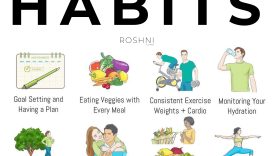Creating Your Ideal Happy and Healthy Lifestyle

In today’s fast-paced world, the pursuit of happiness often feels like an elusive goal. However, embracing a happy lifestyle is essential for overall well-being, encompassing mental, physical, and emotional health. This journey isn’t merely about fleeting moments of joy; it’s about creating an enduring foundation of contentment.
- Creating Your Ideal Happy and Healthy Lifestyle
- Why Focus on Happiness?
- Importance of a Happy Lifestyle
- Mental Health Benefits
- Physical Health Benefits
- Building a Positive Mindset
- Practicing Gratitude
- Mindfulness Techniques
- Nutrition and Diet
- Balanced Meal Planning
- Importance of Hydration
- Incorporating Regular Exercise
- Types of Exercises
- Setting Fitness Goals
- Quality Sleep for Well-being
- Creating a Sleep Routine
- Improving Sleep Quality
- Managing Stress Levels
- Stress-Relief Activities
- Time Management Techniques
- Cultivating Healthy Relationships
- Communication Skills
- Setting Boundaries
- Work-Life Balance
- Time Management Strategies
- Prioritizing Self-Care
- Finding Joy in Hobbies and Interests
- Exploring New Activities
- Benefits of Leisure Time
- Self-Care Practices
- Mindful Meditation
- Setting Personal Boundaries
- Seeking Professional Help
- Therapy and Counseling
- Consulting Healthcare Providers
- Developing a Support System
- Connecting with Loved Ones
- Joining Community Groups
- Embracing Change and Growth
- Accepting Imperfections
- Setting Achievable Goals
- Conclusion
- Key Takeaways
Why Focus on Happiness?
Finding joy in everyday life brings tangible benefits, such as:
- Improved Mental Clarity: A positive mindset enhances focus and productivity.
- Enhanced Relationships: Happiness often translates to stronger bonds with loved ones.
Consider the time last summer when a small act of kindness brightened your day—whether it was a compliment from a stranger or a shared laugh with a friend. Such moments illustrate the profound impact that a happy lifestyle can have on our daily experiences.
Importance of a Happy Lifestyle
Maintaining a happy lifestyle is not just about feeling good; it encompasses a range of benefits that can significantly improve one’s quality of life. Happiness plays a crucial role in both mental and physical health, creating a powerful interconnectedness that fuels overall well-being.
Mental Health Benefits
Embracing happiness can lead to remarkable improvements in mental health. Some of the key benefits include:
- Reduced Anxiety and Stress: Happiness lowers cortisol levels, leading to a calmer mind.
- Increased Resilience: Positive emotions help individuals cope better with challenges and setbacks.
- Enhanced Creativity: A happy mind is often more open to new ideas and solutions.
Take Sarah, for instance, who started her day with gratitude journaling. This simple act transformed her perspective, allowing her to approach her work with renewed energy and positivity.
Physical Health Benefits
The implications of a happy lifestyle extend into the realm of physical health as well. Research shows that happiness can lead to:
- Stronger Immune System: Happy individuals often experience fewer illnesses due to improved immune response.
- Lower Blood Pressure: A positive outlook can result in healthier heart rates and lower blood pressure.
- Longevity: Studies suggest that a cheerful disposition may contribute to a longer life.
Using exercise as a natural mood booster, John began jogging regularly and quickly noticed how his mental clarity improved alongside his physical health. It’s a remarkable reminder that happiness and well-being are deeply intertwined.
Building a Positive Mindset
Cultivating a positive mindset is a transformative journey that significantly impacts overall happiness. By integrating practices like gratitude and mindfulness into daily life, individuals can nurture a brighter outlook and foster well-being.
Practicing Gratitude
One powerful way to build positivity is through gratitude. This practice involves recognizing and celebrating the good things, no matter how small. Consider the benefits of keeping a gratitude journal:
- Daily Reflection: Write down three things you’re grateful for each day. Over time, this trains your mind to focus on the positive.
- Boosting Mood: Regularly acknowledging what you appreciate can enhance overall happiness levels.
For example, last week, I jotted down my gratitude for a delicious cup of coffee and a warm smile from a friend. Those small moments became sources of joy throughout my day.
Mindfulness Techniques
In addition to gratitude, embracing mindfulness techniques can help anchor your thoughts in the present moment. Here are some effective strategies:
- Deep Breathing: Spend a few minutes each day focusing solely on your breath to reduce anxiety and stress.
- Meditation: Practice even a short, simple meditation session to clear your mind and cultivate inner peace.
After starting mindfulness breathing exercises, I found that my days felt less chaotic and more manageable. Mindfulness invites the calm we need to appreciate life as it unfolds, enhancing positivity and mental clarity.
Nutrition and Diet
As we cultivate a positive mindset, it’s essential to remember that nutrition and diet play a significant role in supporting our emotional well-being. A well-balanced diet not only fuels the body but also nourishes the mind, enhancing overall happiness.
Balanced Meal Planning
Creating balanced meals is fundamental to maintaining energy levels and mood stability. Here are some tips for effective meal planning:
- Incorporate Variety: Aim for a mix of fruits, vegetables, whole grains, lean proteins, and healthy fats in your meals.
- Portion Control: Be mindful of portion sizes to ensure nutritional balance without overindulgence.
- Plan Ahead: Dedicate time each week to meal prep, which can save time and reduce stress during busy days.
Last month, I started meal prepping my lunches for the week, and it made a world of difference. Not only did I save time, but I also felt more energized and focused during my workdays.
Importance of Hydration
Hydration is another crucial aspect of a healthy diet that is often overlooked. Staying adequately hydrated can significantly influence mood and overall well-being. Consider these hydration tips:
- Drink Water Regularly: Aim for at least eight 8-ounce glasses of water daily, adjusting based on activity levels and personal needs.
- Incorporate Hydrating Foods: Include fruits and vegetables like cucumbers, oranges, and watermelon to boost fluid intake naturally.
Since I began keeping a water bottle at my desk, I’ve noticed an improvement in my concentration and energy levels throughout the day. Proper hydration not only supports physical health but also helps maintain a clear and positive mindset.
Incorporating Regular Exercise
Building on the importance of nutrition and hydration, incorporating regular exercise is vital for enhancing overall happiness and well-being. Exercise not only strengthens the body but also uplifts the spirit, creating a positive feedback loop that boosts mood and energy levels.
Types of Exercises
When it comes to exercise, variety is key to keeping it enjoyable. Here are four types of exercises you can include in your routine:
- Cardiovascular Activities: Running, cycling, or dancing elevate the heart rate and improve endurance.
- Strength Training: Weight lifting or body-weight exercises build muscle and enhance metabolism.
- Flexibility Workouts: Yoga and stretching improve flexibility and prevent injuries.
- Recreational Sports: Playing sports like basketball or soccer adds a fun, competitive element.
I recently started taking a dance class, and it not only provided a fantastic workout but also filled my week with joy and laughter.
Setting Fitness Goals
Setting achievable fitness goals is crucial for staying motivated. Here’s how to establish effective objectives:
- Start Small: Instead of aiming for the gym five times a week, begin with two or three sessions and gradually increase.
- Make Goals Specific and Measurable: Rather than saying, “I want to get fit,” aim for “I want to run a 5k in three months.”
- Track Your Progress: Keep a diary or use fitness apps to visualize achievements, which can reinforce motivation.
Since I set a goal to run a local charity 5k last spring, my commitment to regular exercise has soared, making it a rewarding and integral part of my daily routine. By incorporating different types of exercise and setting clear goals, anyone can find joy in physical activity and boost their happiness levels.
Quality Sleep for Well-being
As we continue to explore the components of a happy lifestyle, one critical factor often overlooked is the importance of quality sleep. Good sleep habits greatly contribute to mental clarity, emotional stability, and overall well-being. Proper rest not only helps us recover physically but also prepares us to face daily challenges with renewed vigor.
Creating a Sleep Routine
Establishing a consistent sleep routine can significantly enhance sleep quality. Here are some practical tips to consider:
- Set a Regular Sleep Schedule: Aim to go to bed and wake up at the same time each day, even on weekends.
- Create a Wind-Down Ritual: Engage in relaxing activities like reading or gentle stretching at least 30 minutes before bed.
- Limit Screen Time: Try to avoid screens an hour before bedtime to minimize blue light interference with your sleep patterns.
I found that whenever I stick to a regular bedtime, waking up the next day feels refreshing instead of groggy and drained.
Improving Sleep Quality
In addition to a set routine, there are several ways to improve the overall quality of your sleep:
- Create a Comfortable Environment: Ensure your bedroom is dark, cool, and quiet for optimal sleep conditions.
- Watch Your Diet: Avoid heavy meals, caffeine, and alcohol close to bedtime, as they can interfere with sleep.
- Exercise Regularly: Incorporate physical activity during the day, as it can contribute to deeper, more restorative sleep.
After I made these adjustments to my sleep environment, I noticed that my sleep became more restorative and my mood during the day significantly improved. Prioritizing quality sleep is essential for maintaining a balanced and happy lifestyle, allowing us to wake up refreshed and ready to embrace the day ahead.
Managing Stress Levels
Continuing our journey toward a happier lifestyle, managing stress levels is crucial for maintaining mental and emotional balance. Stress can creep in from various areas of life, but with the right strategies, it can be effectively managed. The key lies in identifying stress-relief activities and utilizing time management techniques.
Stress-Relief Activities
Incorporating regular stress-relief practices into your routine can make a significant difference. Here are some effective activities to consider:
- Physical Exercise: Engaging in activities like running, yoga, or dance can release endorphins, boosting your mood.
- Creative Outlets: Activities such as painting, writing, or crafting provide a fantastic way to express feelings and reduce stress.
- Nature Walks: Spending time outdoors can help clear the mind and provide a fresh perspective.
For example, I often find taking a 30-minute walk in the park after a hectic day brings me peace and allows me to unwind.
Time Management Techniques
Effective time management is another critical aspect of stress reduction. Implementing the following techniques can help you regain control:
- Prioritize Tasks: Use lists to organize tasks by urgency, focusing on what truly needs attention first.
- Set Boundaries: Learn to say no when necessary, ensuring you don’t overcommit and create unnecessary pressure.
- Break Tasks into Smaller Steps: Tackling large projects can feel daunting; breaking them down into manageable parts makes them less overwhelming.
Since I began using a planner to organize my tasks and set priorities, I’ve felt more in control and less stressed. By managing both stress levels and time effectively, anyone can cultivate a more positive and fulfilling lifestyle.
Cultivating Healthy Relationships
As we continue to focus on boosting happiness, cultivating healthy relationships is essential. Positive connections with others can provide support and enhance our overall well-being. Effective communication and setting clear boundaries play pivotal roles in building and maintaining these cherished relationships.
Communication Skills
Good communication is the foundation of any healthy relationship. Here are some tips to improve your communication skills:
- Active Listening: Show genuine interest in what others say. Nod, paraphrase, and ask questions to clarify.
- Use “I” Statements: Express feelings without blame by saying, “I feel” instead of “You make me feel.” This encourages open dialogue.
- Be Mindful of Non-verbal Cues: Your body language, eye contact, and tone of voice all convey messages beyond words.
For instance, I recently had a heart-to-heart conversation with a friend where focusing on active listening strengthened our bond, allowing us to share openly without misunderstandings.
Setting Boundaries
Establishing healthy boundaries is equally crucial for maintaining positive relationships. Here’s how to set them effectively:
- Know Your Limits: Reflect on what you’re comfortable with and communicate those limits to others.
- Be Assertive: Politely but firmly express your needs and desires, without guilt.
- Revisit and Adjust Boundaries: Regularly evaluate your boundaries and make adjustments as necessary based on your personal growth.
After I set clear boundaries with a colleague who frequently disrupted my work, I noticed a significant improvement in my focus and productivity. By nurturing effective communication and setting healthy boundaries, we can strengthen our relationships and contribute to a more fulfilling and joyful life.
Work-Life Balance
Moving forward in our journey toward happiness, achieving a healthy work-life balance is essential for maintaining mental and emotional well-being. Striking this balance allows us to maximize productivity while still making room for personal fulfillment and self-care, which ultimately enhances happiness.
Time Management Strategies
Effective time management is a cornerstone of work-life balance. Consider incorporating these strategies:
- Plan Your Day: Spend a few minutes each evening preparing a to-do list for the next day, prioritizing tasks by importance.
- Use a Calendar: Keeping a digital or physical calendar helps track deadlines and important dates, making it easier to manage time effectively.
- Set Specific Work Hours: Define when your workday starts and ends, committing to unplug once your time is up.
After implementing a dedicated work schedule, I found that my personal time felt richer and more meaningful, enhancing my overall happiness.
Prioritizing Self-Care
Self-care is often overlooked in the hustle of everyday life. To ensure you’re prioritizing it, try these tips:
- Schedule “Me Time”: Treat self-care like any other appointment. Block out time each week for activities you enjoy, whether it’s reading, meditating, or taking a walk.
- Disconnect From Work: Make an effort to step away from emails and work-related notifications during your personal time.
- Engage in Hobbies: Pursue activities that bring you joy and help you recharge mentally and emotionally.
I’ve started setting aside Sunday afternoons for a relaxing bath and a good book, a habit that has become a delightful ritual for me. By emphasizing both time management and self-care, individuals can cultivate a satisfying work-life balance, ultimately leading to greater happiness and fulfillment.
Finding Joy in Hobbies and Interests
Continuing our pursuit of happiness, finding joy in hobbies and interests can be transformative. Engaging in activities that ignite passion not only provides an escape from daily stresses but also enriches our lives significantly. Whether it’s exploring new ventures or appreciating leisure time, these pursuits can lead to profound personal growth and fulfillment.
Exploring New Activities
Venturing into new hobbies can open doors to creativity and excitement. Here are some ideas to consider:
- Try a Creative Art: Painting, pottery, or DIY crafts can serve as wonderful outlets for self-expression.
- Join a Class: Look for local workshops or online classes for cooking, dancing, or photography to learn something fresh.
- Volunteer: Helping others in your community can be incredibly rewarding and may introduce you to like-minded individuals.
Recently, I signed up for a pottery class, and the experience of molding clay into something beautiful was not only relaxing but also a fantastic way to meet new people.
Benefits of Leisure Time
Leisure time spent on hobbies presents numerous benefits, including:
- Reduced Stress: Engaging in enjoyable activities allows the mind to unwind and recharge.
- Enhanced Creativity: Participating in creative hobbies can stimulate new ideas and improve problem-solving skills.
- Improved Social Connections: Hobbies often lead to meeting new friends and building community bonds.
After dedicating more time to my gardening hobby, I’ve felt increased joy and a sense of accomplishment seeing my plants thrive. Finding time for interests and hobbies not only adds richness to our lives but also promotes overall well-being and happiness.
Self-Care Practices
As we wrap up our exploration of joy through hobbies and interests, it’s essential to emphasize the importance of self-care practices. Investing time in self-care enhances our ability to cope with daily challenges, leading to a more balanced and joyful life. This includes engaging in mindful meditation and establishing personal boundaries that protect our well-being.
Mindful Meditation
Mindful meditation is an effective way to cultivate inner peace and reduce stress. Here are some simple steps to get started:
- Find a Quiet Space: Choose a calm environment where you can sit or lie down comfortably.
- Focus on Your Breath: Close your eyes and take slow, deep breaths, paying attention to the sensation of air entering and leaving your body.
- Let Thoughts Come and Go: Acknowledge any distracting thoughts without judgment, gently bringing your focus back to your breath.
I’ve found that incorporating just 10 minutes of meditation into my morning routine helps me approach the day with a clearer, more positive mindset.
Setting Personal Boundaries
Establishing personal boundaries is vital for protecting your mental and emotional health. Consider these strategies:
- Identify Your Limits: Reflect on what behaviors or situations drain you and require boundaries.
- Communicate Clearly: Be honest with others about your needs and expectations, ensuring there’s a mutual understanding.
- Learn to Say No: Don’t hesitate to decline requests or opportunities that overextend you.
Implementing boundaries has empowered me to prioritize my time and energy, leading to rejuvenated relationships and a more fulfilling life. By embracing mindful meditation and setting personal boundaries, individuals can elevate their self-care practices, ultimately fostering greater happiness and well-being.
Seeking Professional Help
As we explore the path to a happier life, it’s essential to recognize the value of seeking professional help when needed. There’s no shame in reaching out to specialists who can provide guidance and support, be it through therapy, counseling, or consulting healthcare providers. These resources can play a crucial role in enhancing emotional well-being and addressing deeper issues.
Therapy and Counseling
Engaging in therapy or counseling can provide valuable insights and coping strategies. Here’s how it can help:
- A Safe Space: Therapists offer a judgment-free environment where you can express your thoughts and feelings openly.
- Skill Development: Counseling can equip you with tools to manage stress, improve relationships, or navigate life transitions.
- Enhanced Self-Understanding: Working with a professional can lead to personal growth and increased self-awareness.
For instance, when I sought therapy during a challenging period in my life, I discovered effective ways to cope with anxiety that I hadn’t considered before.
Consulting Healthcare Providers
In addition to therapy, regular check-ins with healthcare providers are crucial for maintaining overall wellness. Here are some key aspects:
- Physical Health Assessments: Regular check-ups can identify any underlying health issues impacting your emotional well-being.
- Mental Health Screening: Providers can recommend appropriate mental health resources based on your needs.
- Medication Management: For some, medication can be a beneficial component of mental health treatment, helping regulate mood and emotions.
When I consulted my doctor about the fatigue I was experiencing, we were able to develop a holistic approach that included lifestyle changes and appropriate medical support. By seeking professional help, individuals can ensure they’re not alone in their journey, paving the way for a healthier, more balanced life.
Developing a Support System
As we continue our exploration of happiness and well-being, developing a strong support system is vital. Connections with loved ones and community groups can provide encouragement, understanding, and shared experiences, making life’s challenges more manageable.
Connecting with Loved Ones
Building and maintaining relationships with family and friends can have a profound impact on mental health. Here are some ways to foster these connections:
- Schedule Regular Check-ins: Make it a habit to catch up with loved ones through phone calls, video chats, or in-person visits.
- Share Experiences: Engage in activities together, such as cooking or attending events, to create lasting memories and strengthen bonds.
- Be Vulnerable: Don’t shy away from sharing your struggles. Opening up can foster deeper connections and mutual support.
When I faced a tough time last year, reaching out to friends and family for support made a world of difference, reminding me that I wasn’t alone.
Joining Community Groups
Community groups can also play a significant role in your support network. Consider these options:
- Local Clubs or Classes: Participate in activities that interest you, such as book clubs, sports teams, or art classes. It’s a great way to meet new people.
- Volunteer: Giving back to your community can help you connect with others who share your values while contributing to a cause you care about.
- Online Communities: Don’t underestimate the power of virtual groups. Online forums or social media platforms can offer support and camaraderie on various interests or issues.
After joining a local hiking group, I not only discovered new trails but also built friendships that have been incredibly supportive. By nurturing connections and involving oneself in community activities, individuals can create a solid support system that uplifts and enriches their lives.
Embracing Change and Growth
As we conclude our exploration of happiness and well-being, it’s crucial to focus on embracing change and personal growth. Life is a journey filled with ups and downs, and learning to accept imperfections while setting achievable goals is key to navigating this path with grace and positivity.
Accepting Imperfections
Recognizing that nobody is perfect can lead to greater self-compassion and understanding. Here are a few ways to embrace your imperfections:
- Shift Mindset: Reframe failures and mistakes as learning opportunities rather than setbacks.
- Practice Self-Compassion: Treat yourself with kindness when you stumble; it’s a vital part of the human experience.
- Celebrate Small Wins: Acknowledge your accomplishments, no matter how small they seem.
When I accepted that I wasn’t going to master a new skill overnight, I found joy in the process rather than focusing solely on the outcome.
Setting Achievable Goals
Establishing realistic goals is essential for fostering growth. Here’s how to set yourself up for success:
- Break Down Goals: Divide larger objectives into smaller, manageable tasks to make them less overwhelming.
- Be Specific: Clearly define what you want to achieve. Instead of “get fit,” aim for “exercise three times a week for 30 minutes.”
- Regularly Review: Reassess your goals and make adjustments based on your progress and changing priorities.
After setting a goal to read one book per month, I embraced the process of learning without the pressure of perfection. By accepting imperfections and setting achievable goals, individuals not only foster personal growth but also pave the way for a more fulfilling and resilient life journey.
Conclusion
As we wrap up our journey toward achieving a happier and more fulfilling life, it’s clear that a holistic approach is essential. By embracing change, fostering strong relationships, and prioritizing self-care, each individual can pave their path to well-being.
Key Takeaways
Reflecting on the various aspects we’ve discussed, consider the following essential points to guide your journey:
- Nurture Relationships: Connect with loved ones and seek support from community groups.
- Practice Self-Care: Integrate mindfulness, proper nutrition, and exercise into your routine.
- Embrace Growth: Accept imperfections and set achievable goals to stay motivated.
In my own experience, adopting these practices has made a significant difference in my life, leading to greater happiness and resilience. Remember, everyone’s path to happiness is unique, so take the time to explore what works best for you, and continue evolving on this beautiful journey of life.





